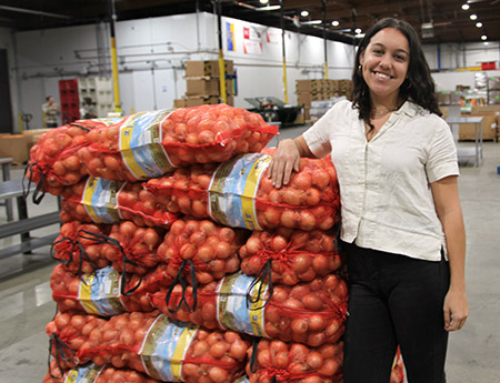For the first time in over 50 years, the Biden-Harris Administration will host a White House Conference on Hunger, Nutrition, and Health. On September 28th, representatives from across the nation will discuss what it will take to end hunger by 2030.
In preparation for this historic gathering, ACCFB submitted our recommendations to federal administrators addressing why hunger exists in the first place, how it can be eradicated, and our role as a food bank in amplifying the voices of the community members we serve. We urge to take action to address the underlying systemic causes of hunger and poverty by working in pursuit of equity.
Read our recommendations:
Alameda County Community Food Bank (ACCFB) is a non-profit, non-governmental organization with offices and a 100,000+ square foot warehouse based in Oakland, California. Our mission is to passionately pursue a hunger-free community by engaging in nutritious meal distribution, SNAP outreach, research, and advocacy in order to eradicate the root causes of hunger and poverty.
It is crucial that the voices of community members who are disproportionately impacted by food insecurity, economic exclusion, and systemic racism are centered at the White House Conference on Hunger, Nutrition, and Health. Our recommendations for this conference and all policy makers are driven by ACCFB’s network of private and public sector partners who are on the front lines every day, responding to hunger. Engagement with community and partners underscores our position that addressing structural racism through an equity lens must be at the foundation of this conference’s focus and policy outcomes.
In preparation for the Conference, ACCFB has been conducting interviews with clients at our drive-through distribution in Oakland, California to uplift community voice. Community members were candid about how the ongoing COVID-19 pandemic and economic emergency is impacting their lives, and the need for investment in structural changes to achieve equity.
One community member expressed their fear that absent immediate action, issues such as housing burden and inflation would exacerbate:
“8 years from now [there] might be more homelessness, gas can/will be $10 a gallon, rent will continue to increase. No matter if you are low income or high income, we all [face] the punishment of our economy.”
Another community member lifted up the burdens that older adults carry during the ongoing pandemic:
“It is important to help one another especially seniors that can’t go out. Our communities need to have more accessible transportation & delivery programs.”
A third client shared that childcare continues to be a struggle:
“Childcare is very expensive nowadays. Sometimes what you earn is just [enough] to pay for childcare. One starts to think, ‘Do I work and pay for childcare or I don’t work and I dedicate myself to care for my children?’ That is why having more resources to affordable childcare is important for me to thrive.”
These stories, and many more that we have gathered, illustrate the urgent need for this White House Conference to result in decisive action to address the underlying systemic causes of hunger and poverty.
ACCFB is also co-hosting a virtual listening session on July 19, 2022 with Rep. Barbara Lee of the 13th California Congressional District, in collaboration with the California Association of Food Banks. We are gathering a panel of service providers, policy advocates, and community advocates with experience living in hunger and poverty, to share their insights on what the federal government must do to end hunger by 2030.
ACCFB is in full alignment with the values and priorities that Rep. Lee highlighted in her letter to President Biden ahead of the White House Conference, especially her emphasis on centering racial equity in the fight to eradicate hunger, given the egregiously disproportionate impact that communities of color have faced during the COVID-19 pandemic and resulting economic crisis. We affirm alongside Rep. Lee that “structural racism” is among the “root causes of hunger.” In her letter, Rep. Lee points out that the pandemic magnified existing racial disparities in food insecurity, which before the pandemic affected “nearly one in eight Hispanic-headed homes and more than one in five Black-headed homes. Similarly, one in seventeen Asian American-headed homes and one in four Indigenous Americans experience food insecurity.”
As such, we applaud Rep. Lee for her leadership in pressing for much-needed reforms to the social safety net, particularly with H.R. 1753, which would lift SNAP’s unjust three-month time limit and would ensure that all people have access to nutrition assistance and stay healthy while seeking full-time work. A serious pursuit to end hunger by 2030 requires “a national strategy to end hunger [which] must be comprehensive and centered around promoting policies that benefit low- and moderate- income households” by “making healthy foods more accessible, expanding federal nutrition programs, and providing targeted support to communities of color that are disproportionately impacted by hunger.” (Quotations from Rep. Lee’s letter to President Biden, 7/15/2022)
Policy Priorities
SNAP
As Rep. Lee points out, our advocacy priorities must be centered around protecting, strengthening, and ensuring equitable access to critical safety-net nutrition programs, especially the Supplemental Nutrition Assistance Program (SNAP), our nation’s most effective anti-hunger and anti-poverty program. In preparation for this September’s conference and throughout the Farm Bill reauthorization process, ACCFB urges the White House and national advocates to:
- Roll-back unjust federal time limits for SNAP that disproportionately impact people of color and immigrants experiencing poverty, and support legislation such as R. 1753 (Lee) that would repeal certain work requirements for SNAP for able-bodied adults ages 18-49 with no dependent children;
- Require SNAP benefit amounts to be calculated using the value of a low-cost food plan rather than the Thrifty Food Plan, thereby increasing the baseline for SNAP benefits by approximately 30 percent; and
- Ensure full inclusion of immigrants in our government’s social safety net. These structural reforms are urgently needed: “A recent research brief from the Food4All campaign – in partnership with the UCLA Center for Health Policy Research – revealed that nearly half (45%) of undocumented Californians are currently experiencing food insecurity. Those younger than 55 experience the highest rates of food insecurity; 64% of undocumented children – nearly two out of every three – and almost half (46%) of adults aged 27-49 are affected by food insecurity.” (Courtesy of the California Immigrant Policy Center)
TEFAP
As food banks continue to address the gaps within the social safety-net, funding for The Emergency Food Assistance Program (TEFAP) and commodity programs are needed more than ever. The impact of the COVID-19 pandemic has resulted in a persistent surge in hunger. ACCFB in partnership with over 300 agency member organizations continues to serve one in four Alameda County residents and distribute over 50 million pounds of food by the end of 2022, well above pre-pandemic measures. The federal government must renew its commitment to the nation’s food banks by providing investments in nutritious food commodities, both for the current crisis, as well as future emergencies, including the impacts of the Public Health Emergency Order’s expiration, a near-term recession, and climate change including drought and wildfires.
Child Nutrition Reauthorization
We also urge that the Child Nutrition Reauthorization process be at the forefront of this work. All children have the right to the nutritious meals they need to grow, learn, and thrive. Building off our historic victory in 2021 that made universally-free school meals permanent in California, we urge that School Meals for All be fully implemented nationwide, so that every child has access to free meals at school, after school, during the summer, and at childcare. California’s successful implementation of universally-free school meals could not have come at a more urgent time – before the COVID-19 pandemic, over 15% of California children were experiencing hunger, and this figure doubled during the health and economic emergency.
Democracy & Voting Rights
Finally, if the eradication of hunger requires uplifting community voice and power, then democracy and voting rights must also be a foundational pillar of this conference. To redistribute power and resources, we need a government that is accountable to everyone. This includes:
- Full restoration of the Voting Rights Act of 1965 and the establishment of stronger safeguards against voter suppression; and
- The abolition of the filibuster. The filibuster continues to exacerbate hunger and racial and economic injustice. It is a chief obstacle to the advancement of our community’s policy priorities such as the John Lewis Voting Rights Advancement Act and the Freedom to Vote Act. Ending hunger by 2030 requires us to be able to pass policies that break up the racialized concentration of wealth and resources. We need a government that adheres to the basic definition of democracy: “The control of an organization or group by the majority of its members.” Therefore, we oppose the filibuster no matter what side of the aisle wields it.
Equity in Government Food Procurement
The White House Conference on Hunger, Nutrition, and Health presents an opportunity to align with ACCFB’s Strategic Partnerships Framework (SPF), an initiative to embed equity into our purchasing practices by leveraging influence and resources to reflect our values in the fight against the root causes of hunger. The program accomplishes this by building a supply base that reflects the people that use food banks and prioritizes partnerships with small diverse local food purchasers with the intention of developing a regional food purchasing policy that supports BIPOC farmers and producers. Black and Brown farmers face very serious, longstanding inequities that are a direct result of centuries of structural racism, including laws prohibiting land acquisition by people of color and unequal government funding to BIPOC farmers. We strongly recommend our SPF model to counter this history by redirecting the government’s considerable purchasing power toward a more equitable food distribution system that supports BIPOC farmers, producers, distributors while engaging input from community members with lived experience with systemic inequities.
As the White House Conference on Hunger, Nutrition, and Health approaches, we urge the Administration and conference stakeholders to take advantage of this pivotal moment in our nation’s history to push substantive and permanent change in addressing the root causes of hunger and poverty. We firmly believe that hunger and poverty do not exist because of a scarcity of food or resources. Rather, hunger and poverty exist because power and an overabundance of resources are distributed inequitably through systems of structural racism.
We look forward to being an engaged partner in partnership with Feeding America and the Food Research & Action Center in co-creating a policy framework for advancing our community’s lived experience and priorities. The only way to eradicate hunger and poverty is by working for equity, which we at Alameda County Community Food Bank define as the redistribution of power and resources.




